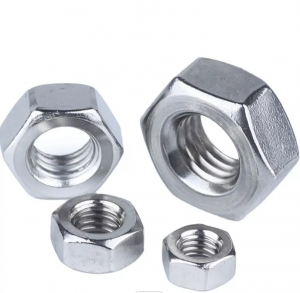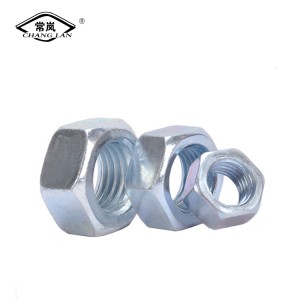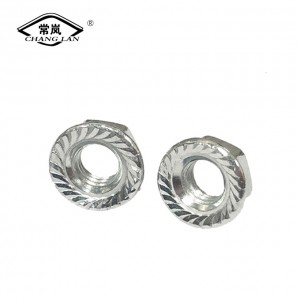-

Weld nuts Square or Hexagon High quality Carbon steel Stainless DIN
Hexagon nuts and screws, bolts, screws with the use of the connection fastening parts. Ordinary hex – is widely used, the characteristic is fastening force is bigger, the disadvantage is that when installation should have enough space, can use when installation live wrench, wrench, open end wrench or glasses all wrench above takes a lot of operating space through the inside of the thread, the same specification nuts and bolts to connect together
-

Stainless Steel DIN 1578 Hex Domed Cap Nut
Hexagon nuts and screws, bolts, screws with the use of the connection fastening parts. Ordinary hex – is widely used, the characteristic is fastening force is bigger, the disadvantage is that when installation should have enough space, can use when installation live wrench, wrench, open end wrench or glasses all wrench above takes a lot of operating space through the inside of the thread, the same specification nuts and bolts to connect together
-

Heavy hex head coupling nuts din 934 hot dip galvanized stainless steel hex nut
Hexagon nuts and screws, bolts, screws with the use of the connection fastening parts. Ordinary hex – is widely used, the characteristic is fastening force is bigger, the disadvantage is that when installation should have enough space, can use when installation live wrench, wrench, open end wrench or glasses all wrench above takes a lot of operating space through the inside of the thread, the same specification nuts and bolts to connect together
-

Zinc plated Galvanized Black DIN557 Stainless steel A2 A4 Square nut
Square nut is a nut, usually we use in daily life or see most of the six square nut, that is, we commonly known as the snail
Bolt. Square nut can be said to be a derivative of hexagonal nut. When the use of hexagonal nut is limited in some occasions or environments, square nut will be used at this time.
For example, in some special environments, it is difficult to install hexagonal nuts. The installation tool cannot install hexagonal nuts well, but square nuts are different
Some small square nuts can be installed directly by hand, and do not need gaskets, not easy to slip. Square nut also has a characteristic is the manufacture of simple, slightly larger specifications of the square nut process than ordinary six square nut is much simpler. The nuts with small specifications are more simple, and can be directly die-cast. Square nuts are most commonly used in closed environments.
-

Hexagon nut
Hexagon nuts and screws, bolts, screws with the use of the connection fastening parts. Ordinary hex – is widely used, the characteristic is fastening force is bigger, the disadvantage is that when installation should have enough space, can use when installation live wrench, wrench, open end wrench or glasses all wrench above takes a lot of operating space through the inside of the thread, the same specification nuts and bolts to connect together
-
Hot Sale Rivet Nut Carbon Steel Flat Head Rivet Nut
Rivet nut, also known as pull rivet nut and pull cap, is used in the fastening field of various metal plates, pipes and other manufacturing industries. It is widely used in the assembly of electromechanical and light industrial products such as automobile, aviation, railway, refrigeration, elevator, switch, instrument, furniture and decoration. It is developed to solve the shortcomings of thin metal sheet and thin pipe, such as easy melting of welding nuts, easy welding deformation of base materials, easy sliding of tapping internal threads, etc. it does not need tapping internal threads, welding nuts, firm riveting, high efficiency and convenient use.
-

Steel Zinc Plated DIN936 Hex thin nut Carbon Steel DIN936 Hex Thin Nut with Internal Thread
Thin nuts and thick nuts in addition to the height of the hexagonal is not the same, other are the same, some installation environment space is not big enough, in order to facilitate installation, will be thin nut design, just can be stuck in the space. This is a last resort. But in some places, where space is not limited, thin nuts are also designed
-

Hex Flange Nut /Nylon Lock Nut/DIN934 White Zinc Plated Hex Flange Head Nuts Fasteners Flanges Bolts and Nuts with Washers
A flange nut is a nut with a wide flange at one end that acts as an integral washer. This is used to distribute the pressure of the nut over the part being secured, thus reducing the possibility of part damage and making it less likely to loosen due to uneven tightening surfaces. These nuts, most of them hexagonal, are made of hardened steel and are usually zinc-plated.
In many cases, the flange is fixed and turns with the nut. Flanges can be serrated to provide locking. Serrated at an Angle so that the nut does not rotate in the direction in which the nut is loosened. They cannot be used with gaskets or on scratched surfaces due to serrated teeth. Serrated teeth help prevent vibration of the nut from moving the fastener, thus maintaining the nut’s holding force.
-

Flange nut
A flange nut is a nut that has a wide flange at one end and can be used as an integral washer. This is used to distribute the pressure of the nut over the fixed part, thereby reducing the possibility of damage to the part and making it less likely to come loose due to the uneven fastening surface. Most of these nuts are hexagonal, made of hardened steel and usually coated with zinc.
-

Lock nut
Fastening nut, self – tightening nut is a common type of fastening nut. Including mechanical anti – loose, riveting and punching anti – loose, friction anti – loose, structural anti – loose. Nowadays, self-locking fasteners are widely used to prevent loose thread: 2. Use various self-locking bolts or ring-grooved rivets to realize self-locking; 3. All kinds of spring washers are installed in the thread connecting pair to realize thread self-locking;